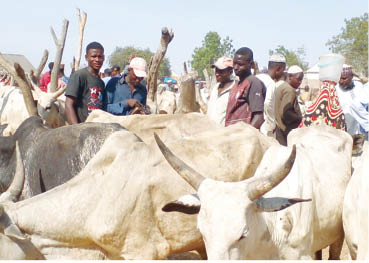‘Gombe slaughters 200 cows, transports 2,450 to South daily’
The chairman of the Gombe State Butchers Association, Alhaji Suleiman Umar Chansa, has revealed that despite the economic challenges in the country, no fewer than 200 cows are slaughtered and 2,450 transported to the southern part of Nigeria daily. In an interview with Daily Trust in Gombe, Chansa noted that although not everyone could afford […]

The chairman of the Gombe State Butchers Association, Alhaji Suleiman Umar Chansa, has revealed that despite the economic challenges in the country, no fewer than 200 cows are slaughtered and 2,450 transported to the southern part of Nigeria daily.
In an interview with Daily Trust in Gombe, Chansa noted that although not everyone could afford to buy meat due to the current hardship in the country, the demand remained high as evidenced by the 200 cows slaughtered daily.
According to him, 150 cows are slaughtered in Gombe Local Government alone, while the remaining 50 are slaughtered across 10 local government areas of the state.
He further said there were 50, 000 registered butchers in Gombe State, adding that some of them inherited the profession as a family business while others joined due to their passion for it.
- Shettima affirms FG’s commitment to North East’s economic revival
- Ramaphosa sworn in for second term, says S/Africans ‘disappointed’
Alhaji Yahuza Yusuf, the acting national president of the Cattle Sellers Association of Nigeria, added that no fewer than 70 trailers, each carrying 35 cows, were transported to the southern part of the country daily. The cows are loaded from seven major markets, including Gombe metropolis, Kashere, Lailaipido, Kurugu, Kumo, Kuri and Dukku.
He mentioned that they paid a tax of N10, 000 on each cow to the state and local governments.
However, he lamented an additional, unofficial levies imposed by non-government officials on roads, which he said posed a risk to the lives of drivers, who fear attacks by miscreants if they failed to comply.
Yusuf called on the Northern Governors Forum to intervene and find a lasting solution to these problems.
